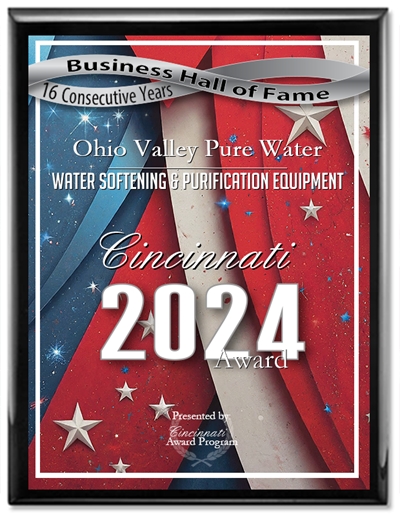 According to the U.S. Geological Survey, more than 85% of the United States' geography has hard water. In Ohio, there is a general hardness level of more than 8 grains, making hard water a common inconvenience homeowners have to deal with. Though you can use a water softener to lessen the hardness level of your water, there has been much debate over whether or not soft water is safe to drink.
According to the U.S. Geological Survey, more than 85% of the United States' geography has hard water. In Ohio, there is a general hardness level of more than 8 grains, making hard water a common inconvenience homeowners have to deal with. Though you can use a water softener to lessen the hardness level of your water, there has been much debate over whether or not soft water is safe to drink.
At Ohio Valley Pure Water (OVPW), we’re here to help educate the public on what is and isn’t safe in terms of water. We’re Cincinnati’s highest-rated provider of water treatment systems and deeply care about your safety and well-being. In this blog, we’ll discuss all things soft water and help you make an educated decision on whether a water softener and reverse osmosis system are right for you and your family.
What is Soft Water?
Soft water, as you may have guessed, is the opposite of hard water. While hard water contains excess calcium and magnesium, soft water is free from these harsh minerals with the help of water softener systems. Though soft water doesn’t contain calcium and magnesium, it does have higher concentrations of sodium bicarbonate ions, which, contrary to popular belief, will not make your water taste salty.
Soft water is measured in the same way hard water is, through the water hardness scale. This scale is measured in grains per gallon (GPG) of calcium carbonate. Your water is considered to be soft if it contains less than 1 GPG. Soft water is ideal for increasing the effectiveness of soap, preventing scale buildup around your home, and combatting dry, uncomfortable skin conditions.
Drinking Soft Water & Your Health
The recommended daily water intake is 2 liters (about half a gallon), and soft water is not recommended as a replacement for the current water you’re drinking. A large concern for homeowners is that water softeners require large amounts of salt to operate. Softener salt is only used to soften the resin that acts on the water—no salt gets into the water supply itself. This is not to say that there aren’t trace amounts of sodium in your water supply after it goes through the water softener process, but it won’t taste as if you’ve just gulped down a glass of ocean water.
At OVPW, we do acknowledge that healthy adults can drink softened water, but in very small doses. The harder your water is, the more salt gets added to the softener, increasing the amount of sodium traces you consume. Most of our customers don’t drink softened water because of the extra sodium intake, which can lead to high blood pressure and other health risks. Instead, most cook and drink with reverse osmosis water, which removes sodium along with thousands of other contaminants.
To learn more, take a look at some of the benefits reverse osmosis water filtration systems provide.
Alternative Options for Your Water Softener
If you do not plan on using a reverse osmosis system, then you should only buy Potassium Chloride (salt alternative) pellets for your water softener. This will put potassium in water rather than sodium, which will help prevent anyone from getting high blood pressure from the water consumed from the softener.
You can purchase Potassium Chloride pellets from major big-box stores such as Home Depot, Lowes, Walmart, and more. But it’s important to remember that this alternative costs about six times more than regular water softener salt—so be prepared to pay more. At OVPW, we recommend purchasing a reverse osmosis system with your water softener to avoid additional costs and protect your health.
Does Your Home Have Soft or Hard Water?
Because water is clear and you can’t physically see the chemicals it contains, detecting hard or soft water can be difficult for the untrained eye. However, a few tell-alls may be an identifier that your home has soft or hard water.
Signs of hard water include:
- Mineral stains on clothing and faded coloration
- Lack of water pressure in your home
- Soap scum forming on your hands after washing them
- Glassware and dishes appear to have excessive water spots
Signs of soft water include:
- Clothes appear cleaner, softer, and less color faded
- Drinking water tastes a bit different than other places you’ve visited
- Soap lathers easily
- Water pressure remains intact
If you’re concerned about whether or not your home has hard or soft water, don’t leave the determination to yourself—contact the professionals at OVPW. Our water treatment team will personally assess your water, abiding by the hardness scale, and determine a proper solution for your H2O concerns.
Cleaning Drinking Water with OVPW
Ohio Valley Pure Water is a family-owned and operated business that has been serving Cincinnati, OH, and the surrounding areas for over 30 years. We go the extra mile in providing all our customers with honest advice regarding how to solve water treatment needs. Whether you’re concerned about soft water consumption or suffer from excessively hard water, our professionals will perform in-depth assessments and suggest a water softener or reverse osmosis system that will solve your water concerns and fit your budget.
Take back control of your water and your health with a water softener and reverse osmosis installation from Ohio Valley Pure Water!
Cincinnati’s Trusted Water Treatment Experts
At OVPW, we believe everyone deserves safe water, both to consume and use. With our state-of-the-art reverse osmosis systems and water softeners, you, too, can experience healthy water every day. Give us a call today at (513) 647-4038 for more information, and start enjoying the Ohio Valley Pure Water difference with better water for the rest of your life.



